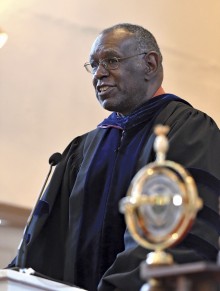Clear vision
“I see you” is an interesting sentence—it has more than one interpretation. It can mean simply that you are in my line of vision—I notice you. Or it can mean something much more profound. I see you—I understand you. I have been listening to you, I have been learning how to understand you—I see you. In this moment of watching you, I know something about the meaning of your actions, and how they are tied to your beliefs and hopes. I see you.
Building community involves building capacity to see in this way. And it is particularly challenging amidst diversity, where you have to go beyond what you have previously known about people and take the time to explore and make sense of the experience of another group, or the perspectives of another person.
The skills for building community in a diverse society are not simple, and they are not just something that happen automatically—they require purposeful action, communication, patience and courage. They require consciousness of others and consciousness of your priorities. During your college years, there are many priorities competing for your attention. You are learning information; you are gaining skills with equipment, with ideas, with language, with critical thinking. College years are also a period in life when questions related to your social existence may be of high priority. Who am I as a unique person? Who are my friends, who are the groups with whom I share interests or identification? And what is my relationship with the rest of the world?
So, because during college years there are many priorities competing for your attention and your time, it is important that we specifically emphasize the importance and challenge of building community, and establish it as a key theme and set of activities on our college agenda.
But our call to you to develop your capacities to build community is not just designed to create positive spaces at Wheaton. “I see you” is an important sentence for the 21st century, and building community is an essential task for the future, as, on a daily basis, we face interaction with diversity locally and around the world.
Perhaps more than any previous generation, it is important that each of you learn about how to engage with our diverse world and build skills of creating community in the midst of differences.
I want to share with you two brief and simple ideas that have resonated with me again and again, and that may help unlock your potential to engage with and learn from the broad sets of diversity that exist on—and beyond—our campus. They both come in the form of conceptual traps that I want you to avoid, by realizing “Yes, and also.”

Second is the idea that the goal of having difference is to eventually make us all the same. In early 20th century American history, the visual representation of this idea was the so-called “melting pot”—the idea that differences would eventually be melted away. Yes, we will have shared experiences, and some shared insights. But I suggest to you that a more appropriate visual representation is that of a salad bowl—a salad bowl in which there may be many components—lettuce and carrots, onions and cucumbers, avocados and walnuts—each part uniting with other parts to create wonderful combinations of tastes, and all contributing to the ultimate succulence of the salad itself.
We are all different. We are all part of a salad bowl of humanity. … Please think deeply about this. … As with other forms of learning, what you learn about building community in your college years will still be among your tools as you approach the year 2100. Let’s approach that future wisely. Let’s unlock our potential to learn from Wheaton’s diversity and from the world’s diversity. Let’s enhance our capacities to see with deeper understanding. I join with faculty and staff in challenging us all to take on the lifelong challenge of Building Community Together.
—Russell Williams, associate professor of economics
Watch the entire Convocation speech on YouTube»
In their own words
A look at the collective effort of constructing connections or go back to Close-knit
Line by line
“Built by individual narratives, one at a time, the Unity Project provided us with a reminder of how communities are formed and reinforced by the unique individuals within them.”
Professor Kelly Goff
Talking about conversation
“We are a place about learning, generating new ideas and facing challenges. So we should be able to use that in response to social questions.”
Provost Renée T. White
Rallying for peace
“When the world is divided, it is easier to target and oppress groups of people. To me, community is about showing up. It is about unity.”
Olivia Benissan ’19, sociology major
Clear vision
“‘I see you’ is an important sentence for the 21st century, and building community is an essential task for the future, as, on a daily basis, we face interaction with diversity locally and around the world.”
Professor Russell Williams
One Wheaton
“Community is built daily through seemingly normal dialogue.”
F. Steven Kimball ’18, economics major
The work of shared responsibility begins within
“Accepting the evidence that the world is structured unfairly and that, unchecked, even our perceptions and behaviors can perpetuate that unfairness, allows us to work together toward change.”
Professors Michael Berg and Karen McCormack
Word by word
“As writers, we understand writing as a way to grapple: It allows an inner confrontation with what, on the surface, we cannot accept.”
Professors Constance Campana, Ruth Foley, Lisa Lebduska and Angie Sarhan
Fitting the pieces together
“As a neuroscience major, I recognize the interconnected nature of everything that I have become part of here at Wheaton. Yet, I am challenged to find the connections between the sciences and social justice issues.”
Kelvin Ampem-Darko ’17, neuroscience major
